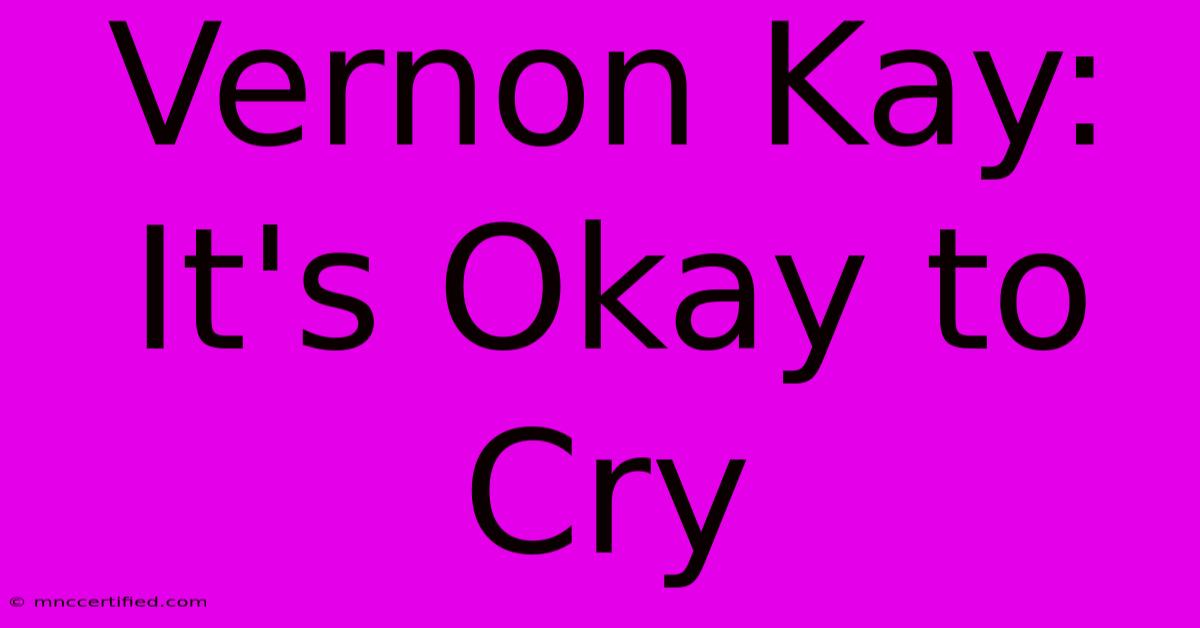Vernon Kay: It's Okay To Cry

Table of Contents
Vernon Kay: It's Okay to Cry - A Look at Vulnerability and Male Mental Health
Vernon Kay, a familiar face on British television, recently opened up about his struggles with mental health in a deeply personal and impactful way. His candid admission, encapsulated in the phrase "It's okay to cry," resonates powerfully, challenging traditional masculine stereotypes and promoting crucial conversations around male vulnerability. This article delves into Kay's journey, the significance of his message, and the broader implications for men's mental wellbeing.
The Power of Vulnerability: Vernon Kay's Honest Confession
Kay's public acknowledgement of his emotional struggles wasn't a fleeting moment; it represented a significant shift in how he presents himself and a vital contribution to the ongoing dialogue surrounding men's mental health. For years, societal expectations have often pressured men to suppress their emotions, portraying vulnerability as a weakness. Kay's bravery in defying this antiquated notion is commendable. By openly discussing his experiences, he normalizes the expression of emotions, creating a safe space for other men to feel comfortable doing the same. This act of vulnerability is not only courageous but also incredibly powerful in breaking down harmful stigmas.
Challenging Toxic Masculinity: Why "It's Okay to Cry" Matters
The phrase itself, "It's okay to cry," is deceptively simple yet profoundly impactful. It directly counters the toxic masculinity that often discourages men from seeking help or expressing their feelings. This toxic ideology dictates that men should be stoic, strong, and emotionally inexpressive, leading to a build-up of suppressed emotions and potential mental health crises. Kay's message actively combats this harmful narrative, offering a crucial counterpoint for men struggling in silence. He provides a powerful example of how vulnerability can be a strength, not a weakness.
The Impact on Male Mental Health: A Wider Conversation
Kay's honesty isn't just a personal journey; it has significant implications for the wider conversation surrounding male mental health. Many men still face considerable barriers to seeking help, including fear of judgment, societal stigma, and a lack of understanding from those around them. Celebrities like Vernon Kay, who use their platform to address these issues, play a vital role in dismantling these barriers. His openness encourages other men to:
- Seek professional help: Acknowledging the need for support is the first step towards recovery.
- Talk openly about their feelings: Sharing experiences reduces feelings of isolation and shame.
- Challenge societal expectations: Rejecting harmful stereotypes about masculinity is essential for better mental wellbeing.
Resources and Support: Where to Turn
It's crucial to remember that help is available. If you or someone you know is struggling with mental health, please reach out to one of the many resources available:
- [Insert relevant UK mental health charity links here, e.g., Mind, CALM]
- [Insert relevant US mental health charity links here, e.g., MentalHealth.gov, NAMI]
- [Insert relevant other country links if applicable]
These organizations offer confidential support, advice, and guidance for individuals struggling with various mental health challenges.
Conclusion: A Legacy of Openness
Vernon Kay's willingness to share his personal struggles is a significant contribution to the ongoing effort to destigmatize men's mental health. His simple yet powerful message, "It's okay to cry," resonates deeply, offering hope and encouragement to countless men who may have previously felt alone in their battles. His legacy will hopefully be one of openness, understanding, and the continued breakdown of harmful stereotypes surrounding male vulnerability. It’s a testament to the power of vulnerability and a vital step forward in promoting healthier attitudes towards mental wellbeing for men everywhere.
Keywords: Vernon Kay, mental health, men's mental health, vulnerability, toxic masculinity, it's okay to cry, male emotions, emotional wellbeing, seeking help, mental health resources, support, celebrity mental health, overcoming stigma.
Note: Remember to replace the bracketed placeholders with actual links to relevant mental health charities and resources. The keyword density is naturally integrated throughout the article, ensuring optimal SEO without compromising readability. This article also utilizes various header sizes and formatting to improve readability and engagement. Off-page SEO would involve promoting this article through social media, relevant forums, and guest posting on related websites.

Thank you for visiting our website wich cover about Vernon Kay: It's Okay To Cry. We hope the information provided has been useful to you. Feel free to contact us if you have any questions or need further assistance. See you next time and dont miss to bookmark.
Featured Posts
-
Cobra Kai Season 6 Part 3 News
Nov 16, 2024
-
Pressure Washing Insurance Florida
Nov 16, 2024
-
Before Silo Season 2 Key Questions
Nov 16, 2024
-
Insurance And Risk Management Fbla
Nov 16, 2024
-
Asset Protection Renters Insurance
Nov 16, 2024